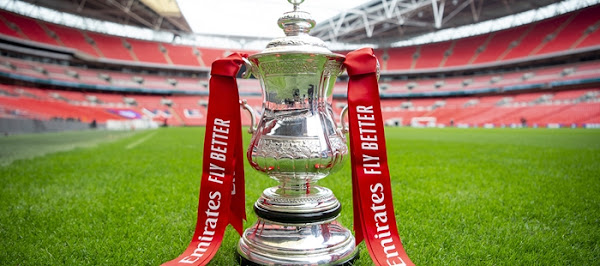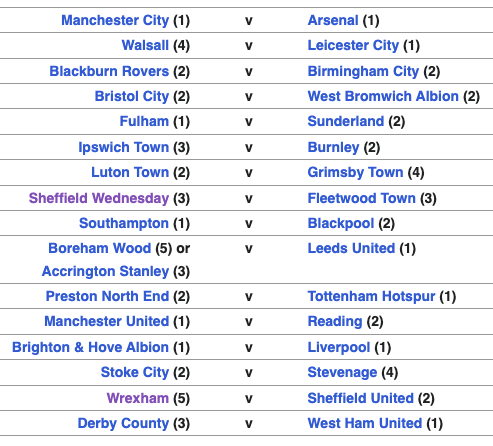My (FA) Cup Runneth Over
By David Hirning
If you grew up a mainstream American sports fan—football, baseball, basketball—like I did, there are three major structural differences that really stand out when you (try to) follow European soccer: no playoffs, promotion/relegation, and cup play.
The “playoffs v. no playoffs” debate is pretty straight-forward: top leagues (like the English Premier League, Germany’s Bundesliga, or Italy’s Serie A) believe that the league champion should be determined by who plays the best over the course of the entire season, not by a knock-out competition among the top teams at the end of the year. (Since in these leagues every team plays each other exactly twice, home and away, there are no concerns about schedule fairness or other unbalancing factors.) They just count up the points (3 for a win, 1 for a draw, 0 for a loss) and the club with the most points at the end of the season is that year’s titlist. So simple.
I can see the merits to both sides of this debate—and since Major League Soccer (the top American soccer league) uses a playoff system, I get to compare the two pretty directly. I figure, vive la différence. Let’s just chalk it up as one of those interesting divergences between European and American sports and move along.
Promotion/relegation (or “pro/rel”) is a little more fascinating to me. Basically, this refers to the annual practice of taking the top several teams from a lower division of pro soccer and “promoting” them to the next-highest level (obviously this doesn’t happen in the EPL, since there is nowhere higher to be promoted to). Similarly, every year each tier of British soccer (including the EPL!) drops the same number of teams that finish at the bottom of the standings (known as the "table" in British sports parlance) down to the next-lowest division.
It would be like if the Seattle Mariners lost 100 games (it’s been known to happen) one year, finished in the bottom three in MLB, and were dropped from Major League Baseball down to the AAA level (replaced by, say, the promoted Toledo Mud Hens). How wild would that be?
Promotion and relegation introduces all kinds of chaos to club finances and creates wild drama at the end of each season, even if the league champion has long been decided (who will finish in the bottom three and get the axe?). I’d love to see some American sports league try it out, although it would probably never happen. But we’ll save this subject for another blog post.
That leaves cup play. What’s THAT all about?
Here’s the best way I can think of to explain how strange cup play is when compared with the leagues I grew up following (MLB, NFL, and the NBA, plus major college football and basketball): Imagine that, say, the Boston Celtics played the Chicago Bulls in NBA play on a Saturday, but then on Tuesday they played a non-NBA team—like a G-League team, or a perhaps a top team from Argentina or Mexico. These would be part of what we call "cup play."
Cup play doesn't have any effect on the regular league standings; instead, these games are part of a separate, cross-league competition. Rather than competing for a league title, the teams involved are playing for a special trophy—somehow the word “cup” became popular in soccer, a term that when I grew up was mostly reserved for cross-nation competitions in “country club” sports like golf (Ryder Cup) and tennis (Davis Cup). There really aren’t any kind of “cups” that teams in American football, basketball, or baseball play for. But somehow, in soccer, they are serious business.
In my previous column about the origins of my Chelsea fandom, I mentioned how important the European Champions League was to my accelerating interest in Euro soccer in the late 2010s. (Sometimes there’s one iconic match that does it—for me, it was this epic comeback by Tottenham against Ajax in the 2019 semis.) Despite the grandiose name, UEFA Champions League is a cup competition (if you trace the history, which goes back to the 1950s, it was formerly known as the European Cup).
I’m still addicted to UEFA Champions League (which has just about all the world’s top players in one competition, even more than the World Cup). But there’s another cup competition that I find the most interesting of all: Britain's Football Association Challenge Cup, known almost universally as the FA Cup.
It's hard to capture the essence and appeal of this competition in one sentence, but I'll give it a shot: it’s an annual tournament that lets just about every soccer team in the entire country compete against each other for the right to be that year’s “cup holder”—kind of a true national champion.
That means that your small-town club could enter and (if they survived the early rounds) eventually get matched up against mighty Chelsea or Liverpool FC. It’s wonderfully egalitarian, and has its roots in the very beginnings of football (i.e., when the sport that we call soccer was first developed and popularized roughly 150 years ago). The first-ever incarnation of the FA Cup was contested in 1871-72.
[Note: I’ve leaned heavily on Wikipedia for much of the below info, as well as the screenshots. Hey, I send them a couple bucks a month, so I feel like I’m entitled. If you can, please send them a donation as well—it's such an invaluable resource.]
According to Wikipedia, the FA Cup is open to the top nine levels of football clubs in England (there are officially 11 levels). This incorporates thousands of teams, so the overall scope of the tournament is huge. Apparently, a record 763 clubs competed in the FA Cup in 2011-12. And they continue to winnow down the field—over the course of many months, since these matches have to be mixed in with matches from still other cups, along with regular league play—until there is just one team remaining (that year it happened to be Chelsea, one of eight FA Cup titles in the club’s storied history).
Note that there are several stages to the competition—we’re not talking about an actual bracket with more than 700 teams in it! (Although… how cool would that be?) Most of the truly lower-tier teams (think levels 5 to 9) get weeded out in the “qualifying stage.” But when the “FA Cup Proper”—which includes five rounds, followed by quarterfinals, semifinals, and the final begins, there are still 124 clubs left alive. Since the EPL only has 20 teams in it, that means there are more than 100 “lower-level” teams still with a chance to compete against the big boys.
For complex reasons that are explained more below, 32 teams actually make it out of qualifying to enter the First Round Proper, where they join the 48 teams from EFL League One and EFL League Two, which are actually the third- and fourth-tier clubs of English football. (I know, all the nomenclature is confusing! Wikipedia explains all, though.) Note that we still haven’t gotten to the part where teams like Chelsea even enter the competition (all EPL clubs get the equivalent of first- and second-round byes in the FA Cup Proper).
So, who are some of these first-round participants, you ask? Let’s take a look at a snapshot of just some of the first-round results in this year’s FA Cup, which took place last November:
A few notes on the above graphic:
- Just look those names! Dagenham & Redbridge! Coalville Town! Sheffield Wednesday (a club that probably started as a pub team that played on Wednesday nights, as opposed to Sheffield Monday*)! You won’t find these clubs competing in the UEFA Champions League, but they exist, they play professional football, and they’re in the FA Cup. (Just ask Mark and Ken, who made a point of catching a lower-tier British football match when they made their Chelsea pilgrimage in 2019—they really enjoyed cheering on fourth-tier Swindon Town F.C. at their home grounds. Listen to the podcast about it!)
- The number after each team name denotes the level of English football the club plays in (this year, clubs from the seventh tier were the lowest level to make into the First Round Proper). When it says “replay” (far left), that means that the two teams drew in their initial match, so—forget stupid penalty kicks—they just played whole ‘nother game at the opposing team’s stadium. (OK, when the second one ends in a tie, then they are forced to go to PKs, as you see here in the epic battle between Hartlepool United and Solihull Moors. Hartlepool advances!) Note that this policy changes when we reach the quarterfinals (for that round and subsequent rounds, all matchups must be settled using the standard extra time/penalties).
- For some reason, cup matches are sometimes refered to as "ties," which has nothing to do with the final score. No one knows why.
- Special shout-out to the third-tier Bolton Wanderers, which is not only one of the oldest teams in English football—it started out as Christ Church Football Club in 1874—but also the boyhood club of my buddy Paul. Bummer that they lost to Barnsley and are out.
(*Wikipedia states that Sheffield Wednesday dates back to a cricket club that was formed in the early 1800s and was so named because that was the day that club members had a half-day off of work.)
As noted above, you don’t see any of the big-name clubs listed in this graphic, because of byes. The 20 EPL (first-tier) and 24 EFL Championship (second-tier) clubs don’t actually enter the FA Cup until the third round, which begins in early January. Those 44 teams are joined by the 20 teams that made it out of the second round, for a total of 64 teams (hmmm, sound familiar, NCAA hoops fans?).
To me, that’s where the fun begins, because a) the matches are often televised on ESPN’s streaming service; and b) you can get contests like the following:
- Chesterfield (5), West Bromwich Albion (2) – Final score: 3-3
That’s right! Chesterfield, one of the three fifth-tier clubs left in this year’s competition, drew their match against WBA of the EFL Championship (a league which many have noted is probably better than MLS in terms of overall soccer talent). And, of course, that means a REPLAY! (West Bromwich Albion, now at home, won that one easily, 4-0.)
Another fifth-tier darling this year is Wrexham, a club that suddenly became famous when the actors Ryan Reynolds and Rob McElhenney bought it in late 2020. Of course, this led to the inevitable television docuseries (Welcome to Wrexham). Hollywood money must be helping, because Wrexham beat second-tier Coventry City in the FA Cup third round a few weeks ago (4-3), and thus became the only fifth-tier club to advance as far as the fourth round this year. BOOM.
The third round is where you start getting David-versus-Goliath match-ups like the EPL’s Tottenham facing third-tier Portsmouth (Tottenham won, 1-0, darn it). Also, because the match locations are subject to a random draw (like the match-ups themselves are—there is no seeding involved), you will occasionally end up with the fun situation where an EPL club will play their third-round (or later!) match at the tiny grounds of a lower-level team. It would be like seeing the New York Yankees play a meaningful game at a small AA-level ballpark.
(That being said, you can also randomly end up with third-round matchups like the one on January 8th that occurred between mega-clubs Manchester City and Chelsea, which was a rematch of the 2021 UEFA Champions League final. Chelsea won that one—their most recent big cup win—but this time it was all Man City, 4-0. Ouch. See my previous column for more on Chelsea’s recent struggles.)
Of course, the dream for all lower-tier clubs is to upset one of the super-clubs and/or somehow go on a magical run and make it to the later rounds of the FA Cup. (In Wikipedia’s parlance, these are known as “giant killings” and “cup runs,” respectively. As that site notes, “Almost every club in the League Pyramid has a fondly remembered giant-killing act in its history.” Well, with 150 years of FA Cup history to draw on, I suppose that’s probably true.)
For example, just six years ago (2016-2017), a fifth-tier club (Lincoln City) went on a run to the quarterfinals. In 1992, little Wrexham knocked off defending cup champions Arsenal in the third round, an event so historic there’s a special Wikipedia article just for that game. (Maybe the magic happens in Wrexham every 30 years or so?) In 1972, non-league Hereford United defeated first-tier Newcastle United in the FA Cup. The potential is always there for such drama.
This year, we’ve reached the Fourth Round Proper, where there are 32 teams remaining. The schedule is set, and play begins this Friday with a juicy battle between EPL-leading Arsenal and second-place Manchester City. (Most of the matches are on Saturday, and there are a few on Sunday and Monday; if you have ESPN+, you can stream all of the below and overdose on cup football.)
Here’s the full schedule:
Winners will move on to the fifth round, which happens in early March. The quarterfinals are held in mid-March, while the semifinals are in mid-April and the final is scheduled for June 3. (The semis and finals are played in Wembley, the national stadium and one of the temples of world football.) Meanwhile, all participating clubs continue to play their regular league schedules.
(Perhaps in a later column I will blow your mind by discussing a few of the “lesser cups,” such as the vaunted EFL Cup, which Chelsea also vies for each year. And that’s not even getting into the major cups contested in other countries, like the Copa del Rey in Spain! So many cups, so little time.)
As for the 2022-23 FA Cup, I guess with Chelsea already out of this year’s competition, all I can say is: Go Wrexham A.F.C.!
[Final Note: OK, this is all well and good for English football. But, you might ask, does the United States have an equivalent soccer cup competition? Indeed, we do! It’s called the U.S. Open Cup, and it was founded back in 1914. My domestic club, the Seattle Sounders, are proud to have won the competition four times—tied with Sporting Kansas City and Chicago Fire of MLS for the most-ever titles by a club that still exists (Bethlehem Steel and Maccabee Los Angeles both won it five times before folding many years ago, before MLS was a thing).
The Sounders also became the first MLS club in the modern era to win their continent’s version of Champions League when they captured the CONCACAF Champions League cup in 2022 (I was lucky enough to attend the final in Seattle). That victory means they get to participate in the Club World Cup next month in Morocco, which is a relatively new and therefore somewhat unheralded competition. But hey, it’s another cup to play for! More updates on that competition to come on this blog.]





Comments
Post a Comment